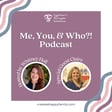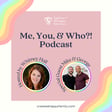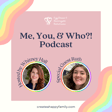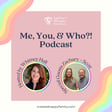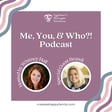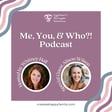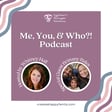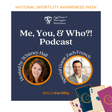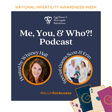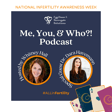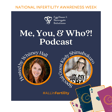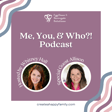Introduction to Katie Inkele and SEEDS Ethics Conference
00:00:00
Speaker
Hi everyone, welcome to a special episode of Me, You, and Who. Today, our Executive Director, Katie Inkele, takes us to the 2024 Society of Ethics for Egg Donation and Surrogacy Conference, or SEEDS Ethics Conference.
00:00:18
Speaker
SEEDS is a nonprofit group which started with the intent of defining ethical practices for egg donation and surrogacy program.
Industry Insights: Interviews with Key Figures
00:00:26
Speaker
Katie sits down with some of the most influential figures in surrogacy and egg donation.
00:00:31
Speaker
You'll hear from Adam Winder, owner of C Trust, Dr. DePeno, founder of Reproductive Centers of America, Lisa Chia, president and founder of Genesis Group, as well as the co-founder and managing partner of Modern Parent Mentor and Surrogacy Mentor, Lisa Stark Hughes, president and CEO of Gestational Surrogate Moms, and Sarah Page, COO of ArtRisk Financial and Insurance Solutions.
Guidance and Support in Family Building
00:00:54
Speaker
Get ready for a fascinating look at how each of these leaders is helping shape the future of family building. Enjoy. me you, and who?
00:01:05
Speaker
Who knew it would take more than two people to have a baby in a world where infertility is no longer a taboo topic. This podcast will take you through all of the different aspects of surrogacy and egg donation through the lens of many who walk this journey in different ways.
00:01:23
Speaker
My name is Whitney Hall. and I am a two time surrogate now turned surrogacy coordinator for egg donor and surrogate solutions. the very agency I used when I chose to carry for two amazing families.
00:01:37
Speaker
With this podcast, it is our goal to help guide and support you as you learn about what it takes to grow a family in an alternative way, as well as hear inspiring and beautiful stories of how this path has changed lives forever. We can't wait for you to hear about just one more way happy families are created every day.
Standardization and Ethics in Surrogacy Agencies
00:01:59
Speaker
All right, we are back here in San Diego at the SEEDS Conference where I get the privilege of talking with Lisa Chia, one of the founders of SEEDS. And um the amazing organization that's been built here is because of your love for this industry as a whole and the intended parents and surrogates and egg donors that get to be a part of it. And so share with me a little bit about your passion behind and why SEEDS was started.
00:02:28
Speaker
I think SEEDS has started because agencies didn't have a home. um we We were all solo islands, and we made up our own rules. It was like the wild, wild west. I mean, some agencies did rogue things, and some agencies are like, we need to do things by the books. We need to do what's right. Their moral compass was like, these are the things that need to happen. And when we saw rogue agencies,
00:02:52
Speaker
We didn't have, we were like, oh, they that's them, this is us. And we really didn't have any communication. yeah um Then I got to know ah few agencies and realized we have more common than we don't have in common. And it was so empowering to meet with other agencies that had the same problems we had.
00:03:10
Speaker
And we could... help solve, create solutions. And so this was a conversation with Wendy Wilson Miller and ah Steve Masler. And we started meeting on a regular basis and we we've found that, you know what, we need a space where all agencies can come and create standardized standards where we can say, this is the gold standard. And if you're a new agency,
00:03:35
Speaker
you have somewhere to go to to look to for advice mentorship and so that's how it kind of started it started with an idea of wanting to do better for our intended parents and kind of giving them a place to say okay these this is where this is where the agencies are going to talk about doing what's right and you want to work with these agencies you know right And so that's how it all started. It was just an idea of an idea. And um slowly it just morphed into this organization because we felt like, okay, we need standards. We need to congregate. We need to convene. yeah And um felt like there needed to be a community because we didn't have that. You know, we talked about mental health professionals needing licenses and continuing education credits in order to maintain their status as a mental health professional. Attorneys,
00:04:24
Speaker
same thing. Doctors, same thing. Well, agencies didn't, we didn't have to do that. We didn't have to attest to anything. We just needed to say, we're an agency and we can accept your money.
00:04:35
Speaker
And then we realized the scandals that were happening over and over and still to this day that happened. And so we wanted to create a place where intended parents could also say, oh, look, there's this organization, ethics organization that values the sanctity of this process.
00:04:50
Speaker
And you know if we work with an agency that works with this program, then at least we can, these individuals are attesting the fact that they are doing things the right way. Right.
Experiences at the SEEDS Conference
00:05:01
Speaker
Yeah. And I will say, you know, I got introduced to seeds a little over five years ago and I remember coming to the first conference and I was like, Whoa, there are so many people doing what I'm doing and wanting to do it well, because since everybody can open up an agency and you know, you can have one experience as an egg donor or surrogate or an intended parent and decide you're going open an agency and then want to walk people through this process. And while the heart is good,
00:05:30
Speaker
The and education and experience is so tough. And so I really respect the fact that Seeds is focused on that as well. Helping other people be educated in this process. And the conference is obviously a great way that we do this.
00:05:44
Speaker
So yeah that part's really cool. So tell me just a little, so our listeners can tell me a little bit about you and maybe your history in the industry as
Personal Journeys in Surrogacy
00:05:53
Speaker
well. Yeah. So I started at an agency.
00:05:56
Speaker
Okay. And I was thinking, okay, I want to continue my education. I'm going to take a break from after college. And so I worked at a marketing company for a prominent egg donor and surrogacy agency and I loved what they did and I i just there were things that were different for me. I am of ethnic descent, I am Japanese and you know something I noticed with the egg donation process was they would categorize all Asians together and so when an intended parent and this was 20 years plus right so it was a long time ago but
00:06:32
Speaker
It wasn't, oh, we're looking for, you know, ah I'm looking for a donor. I want to find a Japanese egg donor because at least I want to find at least one thing that I can connect to another person and say they at least have this, whether I'm left-handed or I'm a c cello player, or whatever it is, I want to have that connection. And so I found that.
00:06:53
Speaker
there wasn't that specific, like Asians were categorized in one lump sum and you know, not Koreans or Japanese and Chinese were all different cultures, you know? And so for me, I found that that was really important. So when I left that agency, i I thought, you know what, I want to create something that that reflects me and you know so i started we we started finding hard to find egg donors like japanese donors east indian donors jewish donors and that's where we found our niche was finding ethnic donors finding donors that um specifically we weren't
00:07:27
Speaker
the most popular donors at the time, but those were the donors that I felt were important to find. So that's how we started our agency with the Genesis Group 20 years ago. um And in regards to me, myself, I i fell in love with industry.
00:07:43
Speaker
You know, my backstory is my mom passed away when I was two. And so my whole life, I had didn't have a mother figure, but so many people stepped in to fill that role. And so, yeah, so family building was a part of my life yeah from the time i was born. And um so for me, I've always seen, you know, that I've always felt that blood doesn't make a family. It's being there, being present, showing up.
00:08:11
Speaker
And so, you know, when I find ni intended parents that are desperately trying to have a family, it emotionally charges me like I want to, what can I do to help? I didn't know what I wanted to do in life from an early age. I just knew that I'd been a position of wanting to help people. Like I believe that people, we meet people for a reason and whether you're teaching me something or I'm helping you, that human interaction is what life's about.
00:08:35
Speaker
And so when I found that intersection, I was like, what do I need to do in order to keep moving forward in this space? And, um, I found that, you know,
00:08:46
Speaker
finding an agency and creating a program that I felt good about was something that I felt strongly. And I think I've always had an entrepreneurial spirit. And so that combined together, you know, created the Genesis Group. Yeah, that's beautiful. I love hearing that.
00:09:02
Speaker
I always say, like, I didn't think I was going to own an egg donation and surrogacy agency when I was a kid, but I, too, knew I wanted to help. But I also knew, like, um the entrepreneurial spirit yeah was there. And then, of course, as an egg donor and then as a surrogate,
00:09:16
Speaker
It was like one plus one. Oh, okay. This is what I'm going to do. So I understand that. All right. Well, we are here in San Diego at the SEEDS conference and i get the privilege of talking with Dr. DePeno.
00:09:29
Speaker
It's a pleasure. and we get to serve together on the board here at SEEDS. So I would love you first just to introduce yourself. Tell us a little bit about how you're in this industry and then what made you get involved in SEEDS?
00:09:44
Speaker
Thank you so much. First, thank you for the invitation. It's a privilege to talk to you. um i think there's a few number of people that I've come across that know as much as I do, not because, you know, we have you have all your past, but I think you're very well integrated. yeah But third party, um the long story and the long version would be ours.
00:10:06
Speaker
The short version is um I myself was have you know I had to go through this infertility story that I wish nobody would have to go through um and for a few years it's always you know the doctor that gets the diagnosis that it doesn't want to have and it was a uterine factor okay and so um we decided to go many routes things were not working for few years down in Yusin where I was okay and te and
00:10:39
Speaker
Yes, and then you know um at the last minute things were about really not and to take a very bad turn. Third party was already the only option and um things got right and I got to have a daughter, um I got to have a son and now I have the third one.
00:11:01
Speaker
um which is a nine, a 13 17. And so my story goes that I needed a third party to get the process of becoming a parent to me and my wife. Yeah, which of course gives you ah wonderful perspective as you are talking with parents that are working to build their families in this way, or even surrogates or egg donors who have to go through the process of medication. So what brought you to SEEDS?
00:11:28
Speaker
How'd you find out about SEEDS?
SEEDS' Role in Industry Standards
00:11:30
Speaker
Why did you, as a physician, want to be a part of SEEDS? Well, seeds was but a compliment. I already heard about seeds for a number of years, and this was back when I was still in Houston, and I had just gotten to New York for when I was at Columbia University for my fellowship in REI, Reproductive Necronology and Infertility.
00:11:58
Speaker
and while in there um I was already scouting for where it would be the third party you know environment for fertility facility that I could have and that I could participate. One of them was CT fertility which I actually ended up and at that moment I already knew a little bit about the concept with John Waldman, which is, you know, and all the people that were trying to organize things.
00:12:26
Speaker
Lisa Chia at that moment was just a connoissance at, you know, at a far. And all of a sudden i see this organization that's has agencies um and part of what we do is ah mechanistically cogwheel of many many parts that get together and they rotate at different moments the egg donor agency the clinic that facilitates all the process in the very beginning but the agency that also permits and permeates all that you know
00:13:00
Speaker
a station carrier from the screening, from the preparation, from the pregnancy until 12 weeks and beyond. And it fascinated me that there was no talk really or environment to talk.
00:13:16
Speaker
Even at the ASRM meetings that we have, we barely have an organization that really is dedicated for that. ACOG has also a part of it, but not very flourished, not until now.
00:13:31
Speaker
And this was the inception of more than 10 years ago. And then, of course, participating in those first meetings, I just wanted to sit on the back.
00:13:44
Speaker
And I'm not kidding you. It was just sitting on the back and seeing the discussions or the problems that the agencies would have. Right. and what they needed to be guided for and it all of a sudden you know really kind of hit me like small little idea which is shouldn't we follow all the same principles in different regions and that got started ah really good relationship not only
00:14:16
Speaker
with the agencies, but that conversation that needs to occur between the clinics and the agencies too, and you know the professionals that do all the psychological evaluations, the mental health, the social evaluation that needs to be done, not only on a gestational carrier, but also on an egg donor,
00:14:36
Speaker
all the upgrades in science that need to be divulged between one part and the other. And the interesting part in the first few meetings, and I still remember, you know, the first few meetings were, so what is this thing about PGS at the time?
00:14:52
Speaker
Right, right. Not even PGTA. It was brand new. Should we do it? And how we going to do it? Is it day three? Is it day five? There was a lot of confusion.
00:15:03
Speaker
And then second part was so natural, which is I need to belong, as many other colleagues of mine, should belong to an organization where we can facilitate this information that is valuable for them.
00:15:18
Speaker
Clinics can communicate more and better with the agencies. We are all at the same level, but with different competencies. means um It doesn't mean that you know the clinic supersedes anyone, but nobody supersedes, but everyone is working with the same objective, which is in the end, the intended parents.
00:15:36
Speaker
to have a baby, the baby that has a better pregnancy because the gestational carrier was chosen well, but also because the egg donor was screened well and had all the conditions.
00:15:49
Speaker
And not everybody can be a gestational carrier, not everybody can be an egg donor. Yeah, we talk a lot about like within our agency or here on the podcast that it's so important to create a team.
00:16:01
Speaker
And that's what you're saying. Like there there's a team, there's a physician, there's an agency, there's mental health professionals, there's attorneys. And the beautiful thing about... seeds and the conference in itself is the ability for all these people to get together to make sure that we are serving everyone, all of our clients and patients well.
00:16:24
Speaker
Obviously the rollout of standards and then for agencies. And now as we start working on standards for other parts of the industry, that's key. So, um, what made you want to join the board?
00:16:37
Speaker
Two things. Um, it came clear to me, which is there needed to be ah voice other than the agency part on the board of seats.
00:16:50
Speaker
And to do this, all throughout before, ah this is you know the 2000 and probably 16 to 17, the idea starts to incept, which is you start to converse with folks saying,
00:17:08
Speaker
can we and we have standards that would be embarking and contain what the ASRAM has already as standards and guidelines and recommendations and also ACOG has ASHRAE on your our European side also has And I mention ASHRAE because many of our intended parents are not only from the US, they're also international.
00:17:32
Speaker
And embarking all those rules and regulations can be a little bit daunting. And then we needed to find a way where the voice could be heard.
00:17:42
Speaker
But also I needed to have a little bit more experience because just, you know, coming flying as a parachute and saying, oh, I know how to do this. So the first things first was to observe.
00:17:54
Speaker
um Actually, i almost joined a couple of committees. It was the Education Committee at the time. yeah And then, you know, I'm talking with Adam. He said, I think it's a good idea because I think we are at the point of this organization where we should be open to embark other professionals and exp expand on the same values over here.
00:18:16
Speaker
We sediment and we actually put a more solidified standards for the agencies, but they're complemented now with others and we don't, we're we're not creating a space at SEEDS where it invades other organizations or even disrupts other organizations.
00:18:35
Speaker
On the opposite. We actually want to follow you know the guidelines for our colleagues for mental health, for example, but also to follow our guidelines for even family doctors that do a little bit of fertility and can counsel and sometimes are those that follow the pregnancies for our gestational carriers.
00:18:53
Speaker
yeah So involving all of that, it came to a point where maybe I should. And then, you know, with certain number of the board members, I came up with the idea, proposed what would be the objectives that then came to, oh um you know, maybe they would like to have a physician yeah among them, you know, invading their space. Well, no invasion. I was so excited when you joined the board because you do bring a different perspective from
00:19:24
Speaker
agency owners. Most of us were agency owners. And then Adam at that time was serving as the president. But it's like physicians play such a key role in in all of this, obviously, but also we learn like as an agency, as mental health professionals, as attorneys, and everybody really does have to work together for this to be successful. And so having your knowledge, the first time I heard you, you did it was on genetics I was like, oh, my goodness, there is so much new information coming out. And so that's so helpful because, believe it or not, like as an agency, sometimes we're the first ones to explain things to patients.
00:20:07
Speaker
and Well, tell me what would be one piece of advice you would give intended parents, surrogates or egg donors that are starting this process?
Finding the Right Agency or Donor
00:20:17
Speaker
um What would be that one piece of advice that you would give them?
00:20:21
Speaker
First things first is find the right form. And finding the right form is you need to know that your vocation is going to be placed in the right, appropriate way.
00:20:35
Speaker
I usually tell this all the time, which is intended parents ask me, and well, you know, how are egg donors so any woman can be an egg donor? No. And the percentage that we get in the very end, I tell you know folks that can be you know a month, an agency can get 50% out of all the you know egg donors that are being represented as a possibility because maybe they don't have the right vocation.
00:21:00
Speaker
Maybe they have a fertility that is okay for them, but it might not be even you know good for the intended parents that they want to provide things for. And I know a lot of gestational carriers, for example, this is a common example, which is, you know, I want to be a gestational carrier, but I had three C-sections and now, you know, I had the complication ah with the last two that was sufficiently contraindicating them to proceed with a new journey.
00:21:30
Speaker
And this is find the right forum, which is who is going to be the right person to answer the questions. so And here gets a little bit more complicated because remember this, it's really difficult for an agency to say, well, you can come to me and I can inform you about everything.
00:21:49
Speaker
but is it sufficiently separated from the intent of having that egg donor? Is it sufficiently independent from the decision that you don't want to coerce the other person and put yourself in that environment? That's where I think seeds can come up, which is we furnish not only the agencies with the right tools for them to inform intended parents, not only to inform donors and gestational carriers,
00:22:17
Speaker
And from the inception, they should have at least a little bit of a uniformized kind of manner. ACOG does it. We have the bulletins. ASRM does it. And we should probably implement some sort of you know way, very seamlessly, so that the intended parent goes and says,
Unified Standards Across States
00:22:38
Speaker
how do i how do i start what are my next steps is it the agency that i start with should i be looking at egg donors what do i need to do so many little thousands of questions that can be very well dissipated and let me also tell one thing i want to involve the clinics in this because here's here's the problem that i will tell jokingly i can say you know yes doctors like you know to have you know There's a little bit of sway in saying that they should be in the top of the food chain.
00:23:15
Speaker
And we're not. we are We are as in important as the step that we provide. And every step will be important because if you don't have a right OBGYN with the right MFM means maternal fetal medicine because the that young lady is you know passing through a peril and you anticipate that peril and we put it with the right environment then we don't become as important as we think we are we are important as a team
00:23:45
Speaker
And I usually say, you know, a team, pardon me for alluding for a little metaphor, but the police officer cannot catch a thief maybe by itself, but a department, they can.
00:23:59
Speaker
And so unified, we can do a lot of things positive towards the end. And yes, it takes a little bit longer than we would wish. And sometimes everybody won't agree with the same principles everywhere. that's That's where I think SEEDS can do platform where we have standards.
00:24:18
Speaker
And standards means a baseline that everybody actually can follow and be good with it, independent of the state, independent of anything that they're doing.
00:24:30
Speaker
It is the standard that we should provide that care either clinically, either to an egg donor agency, either to gestational care agency, escrow account, all those elements that are needed.
00:24:44
Speaker
We need to have an organization that can provide that huge unified, unison, with one voice, seats. Yeah. And that's I mean, that is what Seeds bringing is bringing to the table.
00:24:56
Speaker
The standards, the education is huge. And so I know as an agency owner, if we can't serve somebody with an egg donor or surrogate, the first thing I say is go to the Seeds directory, like make sure that the agency that you go with is there so you know you are getting that standard.
00:25:14
Speaker
um Coupled mental health attorneys, all of those things can be an escrow agency. It's not to provoke, you know, this is not to provoke an environment where folks feel restricted on their own environment to do what they usually, you know, or used to do. It's just to maintain format that irrespective of the playing field, the intended parents or the, the client, I don't like that word, but the care that you're going to provide to one of the elements that is going to be fundamentally important, you're providing it in the best way that you can.
00:25:55
Speaker
You probably maybe are providing you know some knowledge about putting an egg donor in a registry because it sounds good. Are you obligated to do so? Probably not yet. But should you?
00:26:06
Speaker
Probably. um There is a lot of little questions that we can answer intermediately and also a forum where folks can also protect themselves and provide the information even to protect themselves.
00:26:18
Speaker
you know Was this done in the correct way? we can actually help or assist folks in saying, well, there's many ways to get to the same place in the very end.
00:26:30
Speaker
And you know maybe we shouldn't use this one, and this one would be a more appropriate way. I really feel strongly about this. ethics is the major part of profession like being a doctor and doctor being a doctor and being a physician is no different than what you do i'm sorry to say this but you probably have a more important role yeah sometimes than i do i don't know about that but every it's a team it's a team it is yeah Okay, well, as we wrap up our time together, um i would love to ask you what this, we asked that that at the end of all of our podcasts, but what filled your cup today, either figuratively or literally, what filled your cup today?
00:27:13
Speaker
What filled my cup today? the calmness of the serenity of the environment that we are. That filled my cup today.
00:27:25
Speaker
It's really hard to find, you know, ah pardon of me for saying this, but I think I can involve you in that part, which is we live very busy lives. um and you know having a restful moment talking about important things but the water as a serenity and the focus that sometimes you know we have to maintain attentive to millions of little parts and sometimes i you know like i usually say i wanted to get to that email i didn't get to that email on that time and it's it's such a busy life that we bleed for others that ever so often we forgot that you know
00:28:05
Speaker
There's little ponds. so yeah Yes. around here This is beautiful. Yeah. This is so nice. Well, thank you so much for joining today. I am grateful for your contributions here at SEEDS. And thanks for coming on.
00:28:18
Speaker
Thank you. Thank you. Thank you so much. We are here at the SEEDS conference fall of 2024 and I get the privilege of talking to Adam Winder.
00:28:32
Speaker
He is part of the board at SEEDS. We are in San Diego, hence the beautiful background as opposed to podcast studio. So Adam, tell me a little bit about your role in the industry and also your involvement SEEDS.
00:28:45
Speaker
Yeah, so i have the privilege of being the one of the owners of Sea Trust Escrow. and Our primary function is holding the funds um for independent parents, surrogates, and donors and managing between all parties.
00:28:58
Speaker
So we entered, we started our escrow business about nine years ago, going on 10 and have really taking a key role in kind of transforming what escrow really means in the industry, which we're really proud of, really making it more transparent, more secure and better for everybody involved.
00:29:13
Speaker
So your role in SEEDS as an organization that started with agencies, you obviously bring a different perspective to it being that you're an industry professional. So tell me why did you choose to become involved in an organization like SEEDS?
00:29:30
Speaker
Yeah, you know, coming from a different industry, I came from banking and finance. There was always just really strong trade organizations that brought everybody together, set policies, set standards and had influence for the better for the industry.
00:29:43
Speaker
And when I looked at the space, when I first entered, obviously there were great organizations for the doctors and for the attorneys, but SEEDS was well positioned not only to be the organization for agencies, but also an organization that brings the whole industry together and one place. So for us, for me, i became very passionate about that and very passionate about the idea of setting setting standards and providing education that allows the industry as a whole to grow and grow for the better.
00:30:08
Speaker
Yeah. And we're definitely seeing that through standards that were created last year and you played an integral role in that. um So what does it mean for you to be a part of the board at SEEDS?
00:30:19
Speaker
Yeah. So I started off at SEEDS volunteering on committees and then became a committee chair and then after committee chair, got the opportunity to become president of the organization as an officer for ah two and a half, three years, and then after got elected to the board. So I've kind of been at all phases of the volunteering for SEEDS.
00:30:39
Speaker
But at the at the board, the key thing is, is our job as the board is really just to set the overall strategic direction and making sure the organization's on the right track to hit our objective. So we, since I've been involved with SEEDS, we took the board from technically two people, the two founding members, to expanding it to five, and that's when Katie came in. yeah um and And that's when we really started to go faster, really making progress for the organization. And then from now from five to seven. So we have a large board that's diverse, that brings different opinions. So it's not directed by one person or one strong opinion, it's directed by the vote of a group of people that are ultimately voting towards the benefit of seeds.
00:31:18
Speaker
Yeah. And not only the benefit of SEEDS, but the benefit of the industry as a whole. Surrogacy and donation is not federally regulated. um And so SEEDS itself is coming in to help create those standards and best practices.
00:31:35
Speaker
So the flip side of that, I would say, is a lot of intended parents and donor surrogates don't even know about SEEDS as a whole. And so what what would you say is most important for either of those three clients to know about the organization of SEEDS and how it can best serve them?
00:31:54
Speaker
Yeah, I think SEEDS as an organization was founded with the principles of providing education and bringing the community together so we can all get better and better serve the clients and also to set standards and the organization has been on that journey ah for a long time and we've officially set standards and have a detailed process that these if followed these standards protects everybody involved the intended parents surrogates the donors in the industry as a whole so as an intended parent or surrogate thinking about who to work with whether it's a professional or an agency
00:32:29
Speaker
they should look to the SEEDS logo to say this is an organization that has set standards, they're there, they're learning, they're bettering their business, they're bettering their practice, and they care about the industry as a whole. So that's that's the goal of SEEDS, and we're continuing to move into further further ways of setting compliance and ensuring and membership is up to date with our standards which we're really excited about yeah okay that's awesome we have a lot of people who listen to this podcast that are brand new to the world of either surrogacy or egg donation um they're learning about seeds or they're learning why is escrow so important um so what would be your best advice for someone that is just
00:33:10
Speaker
starting initially, specifically as an intended parent, and they're building that team of people around them to support them on this journey.
Selecting Knowledgeable Professionals
00:33:18
Speaker
Yeah, that's a great question. But first of all, the process is so beautiful and so meaningful.
00:33:25
Speaker
And we feel as an industry professional, so happy to be part of helping people build their families and making it possible through this through a service and education. Having said that, it's also complex, emotional, expensive, and it's a medical process. So there's no necessary guarantees per se.
00:33:46
Speaker
that the process is going to go perfect. yeah But ah most most of them go really well. But it's important that you surround yourself with the best professionals in every category. Right. So having the privilege of talking with a tongue tie today, having the privilege of working. We've worked with over 413 agencies, for example, over the years.
00:34:06
Speaker
And there is a difference depending on which agency you select. There's a difference based on what attorney you select in your in your surrogate or donor select. and also the insurance providers and the doctors, everything matters. Right? So take the time not to protect, to be particular and that and make sure you have the best partners in every category.
00:34:25
Speaker
yeah Like for our segment of the business is often afterthought in escrow. But if escrow is not managed well, in the absolute worst scenario, money could be stolen or taken lost like we've seen and the past, which is terrible and why we exist to ensure that doesn't happen.
00:34:42
Speaker
But, It can also just create process pain and put everybody at risk and create unnecessary financial stress between the parties. The intended parents and surrogates or donors should be focused on the beautiful process of having the baby, not the legal, you know, financial.
00:34:59
Speaker
Leave that to the professionals and make that process easy and guided well. If you have the right team around you, you'll you're greatly de-risking your stress and your risk. Yeah, that I mean, that team is key because, you know, and know we say from an agency perspective, like we do this all day every day. you do as well from a financial standpoint.
00:35:20
Speaker
You know, I know we respect the fact that you have attorneys that are looking through contracts and it's easy. You disperse money based on what the contract says. and But you have to have the professionals on your team to make sure that that's being done well and um that does allow everybody to just enjoy their time and their journey in this process.
00:35:40
Speaker
Yeah, absolutely. and And look, the agencies are the real heroes in the process of bringing everybody together, guiding everybody. really It's really working to guide this very complex process. um And it's a very hard role in the industry because it's so complex and they have to make sure they're they're helping coordinate all the professionals and bringing in the right people and guiding the clients through all of the entire process. so um Picking the agency is key, but also the partners are critical because the agencies have to count on them in a lot of areas and the financial piece is one of them.
00:36:09
Speaker
For sure, yeah. Okay, so anyone who listens to our podcast regularly, we always ask the question, what filled your cup today? So either literally or figuratively, what filled your cup today?
00:36:21
Speaker
Admittedly, I probably drink too much coffee, right? So when I travel, I don't get the the amount of coffee I usually get at home, which is embarrassing. But no, what fills my cup today is being here in San Diego at Seeds.
00:36:34
Speaker
I'm going to see all of our colleagues in the industry. They're so passionate about helping people seeing seeds grow in terms of impact and and the and the that we're having it just it truly makes me so happy to be part of such a beautiful industry having such a big impact yep it's a privilege to be in this space and be with other people that leading towards making this a great experience for every single family surrogate and egg donor who are embarking on this journey and have that common goal of
00:37:06
Speaker
doing it well, where everybody ends well. Yeah, and what Seeds is doing in terms of setting standards and self-regulating and raising the bar in the industry across the board is so beautiful for everybody ah involved and all of the families. So I'm just so happy to be part of that.
00:37:24
Speaker
It's amazing. Thank you for having me on. Yes, thank you for coming, Adam. Appreciate it. Thank you. Hi, Sarah. It is so nice getting to spend some time with you.
00:37:35
Speaker
um And I would just love to hear more about
The Role of Insurance in Surrogacy
00:37:40
Speaker
you. i would love for you to introduce yourself to our audience, what you do in the world of third party and your involvement in SEEDS.
00:37:49
Speaker
Awesome. I'm super happy to do this with you. and So I am currently the residing COO for ArtRisk Financial and Insurance Solutions. And I have been doing this for 15 years or been in the wow technology community for 15 years.
00:38:05
Speaker
and and then started being involved with SEEDS about, but oh gosh, it's almost been five years now that I feel like I've had some kind of an active participation outside of just attending conferences.
00:38:17
Speaker
um I started on the membership committee and then I chaired the membership committee and now I'm a current sitting officer. I and act as the secretary on the officer team for SEEDS.
00:38:29
Speaker
Awesome. Well, okay, you have more of a unique perspective to SEEDS and to the industry because you're in the insurance world. And insurance is so complicated and it's changing all the time.
00:38:46
Speaker
So tell me, what is the importance with insurance, with egg donation, surrogacy, and why it's important for intended parents to know about insurance and kind of how SEEDS has come alongside in this process to ensure that it's ethical and that it's meeting people's needs.
00:39:06
Speaker
Yeah. So, um, you know, kind of one of the big things that we look at during the whole process is we look at the contract that the attorneys do. And we say, okay, in the contract, there's certain things that the intended parent is responsible for paying for. And this can be with either the donor or the gestational carrier.
00:39:24
Speaker
And so what insurances that we sell, our insurances are going to protect both parties. so we're going to protect the intended parents financially. And then also we're just going to make sure, again, that the gestational carrier as well as the donor has proper coverage for themselves,
00:39:37
Speaker
That includes life insurance in case something happens, loss of reproductive organs. So we're really just making sure kind of across the whole journey that both parties are going to be protected on the insurance side.
00:39:48
Speaker
um SEEDS has been super wonderful because what they have done is said there are certain insurances that are really important to have. Number one is a business, professional liability.
00:39:59
Speaker
That's one of the mandates of being a member is to have that as a business, which I think is great. And then outside of that is setting certain limits on the minimum of life insurance and making sure that it's in play and the time period of which it should be in play.
00:40:13
Speaker
Again, looking at it from a protection standpoint of, hey, gestational carriers need to be protected for their families in case anything happens. And so SEATS has been wonderful, not only about putting in some of that verbiage to help protect But then also having in the conference realm, um making sure that there's panels that we talk about insurance and the changes that are happening and brown bags, which are our monthly educational series at SEEDS. Just making sure everyone's really up to date on what's going on. And if there are changes or shifts, let's say even from a legal perspective, that on the insurance front, we're keeping up with those changes so that no and there's no loopholes or or cracks that we're missing in the journey.
00:40:52
Speaker
Yeah, I mean, Insurance is one more thing that seeds is coming alongside agencies, attorneys, which of course then ripples down to intended parents, surrogates, and egg
SEEDS as a Resource and Support System
00:41:06
Speaker
donors. Because if you're not attending these conferences and if you're not going to Brown Bags, yeah I'm not sure.
00:41:14
Speaker
There is not any other resource in the industry That is ensuring that families and surrogates and egg donors are protected. And that is another great reason why seeds membership is yeah so important.
00:41:29
Speaker
it's It's a local place. I think there's something where, um you know, as a business, we we we hold webinars and we do things like that. And a lot of other businesses hold webinars as well. But I found that SEEDS is a wonderful collective space to get all of that information.
00:41:45
Speaker
hear also from all the different stakeholders about how what the impact is going to be. You're really coming from a group-orientated perspective. And I really appreciate that about SEEDS, about how collaborative and community-oriented is.
00:41:59
Speaker
So again, when you join, you're not trying to find all the information. It's going to be there for you. again, and the via brown bags or the newsletter or those conferences.
00:42:09
Speaker
So they really do a great job of centralizing all the information, which is insanely helpful as as a business person and and trying to be the support for all of the intended parents and gestational carriers.
00:42:22
Speaker
Okay, tell what made you decide to be involved now, you said a little over five years ago, SEATS? ah So i I've always loved ethics. I used to take ethics courses in college just for fun because I thought it was so interesting.
00:42:38
Speaker
um how it was never really black and white, but it was an open conversation and that it was constantly moving in in coordination with the world around you. And I always thought that was really interesting in general.
00:42:50
Speaker
um I started getting involved more in SEEDS, again, with my love of ethics, but also looking at it from a standpoint of these are all people that want to do good and want to do right. Mm-hmm.
00:43:02
Speaker
by the community that we're serving. And i think that just speaks to me in general of wanting of wanting to be a part of that um i And I am a natural person who wants everyone to be included. So membership was kind of a natural segue for me. Like, hey, come be a member.
00:43:20
Speaker
That's where we met each other was on the membership committee. It was great interviewing people, finding out about what they did and why they wanted to be a part, hearing their story.
00:43:33
Speaker
ah westful and And it was and I think that that then kind of segued into, um you know, being the chair and I was co-chair for a while and then ended up being chair chair. And I think that was that was fun because I felt like we were able to really.
00:43:51
Speaker
open it up a little bit more. and That's where we kind of said, okay, hey, if you're international and you are doing business in the United States, we didn't used to have that. were able to open it up in that capacity.
00:44:03
Speaker
And then we really started taking a look at who are we missing in our membership? And starting to really work on getting more stakeholders in there. This started out as an organization for agencies.
00:44:15
Speaker
um And then we started getting attorneys and escrow and yeah insurance, which is wonderful. And then we realized, hey, we really need mental health in here. We really need medical. And so we were able on the membership side to kind of hone in on that. So that was when something that I really enjoyed doing was trying to figure out how do we get this to be something that more people want to be involved in um and be a part of because their voices are super important for us to have, again, kind of this global view of surrogacy.
00:44:45
Speaker
um And then outside of that, I just always like being more and more involved and in anything that I believe in and that I like. ah So then I was like, hey, I could also um be an officer or do something, you know, do something like that. And so the opportunity presented itself. And I was very thankful for being asked to be an officer and have, honestly, it's been one of my greater roles that I've had is being an officer for SEADS the last yeah year. We just passed the year mark for us officers. so
00:45:19
Speaker
Well, I can tell you as a member of the board, Our officer team is absolutely amazing.
SEEDS' Vision for Industry Change
00:45:27
Speaker
And you all are setting the tone and are just working so hard to ensure that Seeds continues to move along, to be that supportive space and be that resource that agencies, mental health,
00:45:46
Speaker
everybody needs in order to survive because ultimately we do all have the same goal. And that is to serve these intimate parents, these surrogates and these ad donors really well through this process and it be ethical.
00:46:00
Speaker
And not enough people are talking about that. We all know that not enough people are talking about how well it's being done by so many, but seeds is a huge part of that.
00:46:11
Speaker
It is. And I, and i really love, I love that you said we have a great team. We have a great team. We have a great officers team and yeah and very much are all in sync and see the vision of Seeds moving forward, which has been really nice and making sure that kind of in our time with it, that we're able to really make an a lasting impact every time right meet.
00:46:35
Speaker
We're not looking at the here and now. We're looking, okay, how is, what is the impact five years from now with the decisions that are being made? And I mean, I can't say enough about that. Yeah. I'm like, I feel so thankful to be a part of it. Right.
00:46:49
Speaker
Yes. No, I love that. That's so good. Okay. My last question for you. Yeah. And, and all, you know, from living in the insurance world, as well as SEEDS,
00:47:01
Speaker
If you had to give one piece of advice to anyone building their family this way or surrogate or an egg donor, what would that be? Um, um Oh, gosh, I would say don't settle.
00:47:15
Speaker
um Don't settle. If something doesn't feel right, talk it through. Lean on. That's so good. Lean on your attorney. Lean on your agency. Have the hard conversations. I think that's a big thing. and Yeah, I mean, this is ah this is a journey and you're in it for forever.
00:47:31
Speaker
you know, around two years. And I think the biggest thing is to make sure that this feels good. and so, yeah, so that's my thing is don't, don't settle. If it doesn't feel right, then press forward and ask the hard questions and have the hard conversations.
00:47:46
Speaker
That is so good. Don't settle. Ask the questions, even if they're hard. Yeah. In order to understand and feel comfortable with those next steps, because you're right. If,
00:47:58
Speaker
If you kind of leave that gray at the very beginning and then something, you know, it's kind of that the mountain is what it ends up building. You know, it's a small, tiny hole of disconnect or a lack of communication. And then it just builds.
00:48:13
Speaker
It's much easier to ask the question and not feel the gray moving forward. Everyone tries to educate themselves. And I think that was like my first thing in my head when you asked the question was like, oh, well, educate yourself.
00:48:24
Speaker
But it's way beyond that. There's so much education out there that sometimes it becomes super overwhelming because you're being fed so much info and you're doing your research and you're reading, you know, ah blogs and posts and you're talking to your attorneys and your friends that have done it or you're in a group or support group.
00:48:41
Speaker
And I think that at the end of the day, it is really goes back to. what sits well on your heart and move forward in the journey. And that's kind of, but that to me is always going back to like asking the hard questions, having hard conversation and um yeah, feeling good in it.
00:48:59
Speaker
That is so good. Well, thank you so much for your time today, Sarah, and sharing your expertise, not only in insurance and what families can look there, but how seeds has come alongside and how beneficial it is.
00:49:14
Speaker
for people looking at this niche. Appreciate you. Thank you. Bye, Katie. Lisa, thank you for joining us here.
00:49:26
Speaker
I am just so excited to talk to you because of your heart around education and what that means for
Personal Surrogacy Experiences and Legal Implications
00:49:34
Speaker
seeds. So before we get started, tell me a little bit about your history, you, yourself, your history in the industry, but also your history with seeds.
00:49:45
Speaker
Okay, so um I myself was a surrogate twice. I carried twins first and then ah full term, no complications, all that kind of stuff. um And then I carried a single um the second time. and Then I worked for an agency. And then when that agency was sold, then I started my own agency. And so I've been doing this for
00:50:11
Speaker
gosh, 17 years now, something like that. So you have, no it's you have a lot of experience. You've seen a lot. Things have changed a lot in the industry.
00:50:23
Speaker
So tell me where that kind of led you with seeds and your heart and serving the organization here. Yeah, so when Seeds first started, um I'll be honest, we were kind of like, okay, let's wait and see how this goes, you know, like, let's see what this is really about.
00:50:41
Speaker
We went to a few conferences, kind of checked it out. um And then i actually went to some of the founders, and I'm like, okay, like, you asked for help, I'm here to help. And then they didn't really ask for help.
00:50:53
Speaker
I mean, they like never got back to me. And then, you know, the next conference they were asking, you know, like, hey, if you want to volunteer, it's a volunteer organization. I was like, volunteer? like, just let me know what you need.
00:51:04
Speaker
Eventually, like they took me out on um my offer. And, um you know, first I was a part of the education committee. And then I later took over as chair.
00:51:16
Speaker
um And what the Education Committee does is, well, at this point now, it has develop has grown. But at this point now, we do monthly webinars.
00:51:27
Speaker
um And then we do two conferences a year. ah Back then actually... it wasn't quite like, we actually moved to those webinars during COVID. So it was like yeah a developing thing because we couldn't have our conferences. So how do we keep people educated? right Especially, you know, during COVID things were obviously changing.
00:51:49
Speaker
Like, How are you supposed to do it like before? Yeah. Before um before COVID, you know, the standard was kind of like in-person psych evals. Well, now that nobody can meet in person, now what do you do? You know, there's a lot of things to adjust. it It's a field that changes quite often.
00:52:07
Speaker
um especially because every single state has their own statutes or rules or different things, not all about who can have, who can, you know, how use a surrogate, like have a surrogate, um what the requirements are, like if they have to be biologically related or if they have to to be a married couple or, know, but then also you have the legislation in between, i mean, like for each individual state,
00:52:35
Speaker
that also can be changing. it's just a lot of things. And the reason why um like what I used my ah surrogacy money for was to go to law school. And one of the things that really I found fascinating during my first journey was how every single state had different um laws about surrogacy.
00:52:57
Speaker
And they came from different places. So like some, ah like Utah, for example, is based on their family law. Like that's the direction that they went. Like, let's make it like that makes sense to us. So we're going kind of make it similar to our adoption laws.
00:53:13
Speaker
um In California, it's based on contract law. You two have a contract, you know, you're legal, you follow the contract rule, done. Yeah.
00:53:24
Speaker
It's not so much about are you qualified to be a parent? Like it can be if it's based on family law. So anyway, i just found all of that fascinating. And so that kind of got me into the field and why i really love education is because.
00:53:43
Speaker
not only are things always changing, so there's always new things to learn, but it takes a while. Like some people even tell you, like if the agency is less than five years old, like be careful.
00:53:58
Speaker
And, and the reason is because there, Think about a surrogacy journey, for example, like one journey takes like a year at least. Or two of these days. As I'm saying, yeah it as long as if everything goes perfectly, like yeah a year. So if an agency has only been in business for five years, they haven't run into some of those like weird wonky things that may or may not happen.
00:54:23
Speaker
And that's not even getting into... really weird things like COVID or like we once had an egg donor that was in Boston for screening when the Boston bombing happened. And, you know, like there are things that can happen. It's not a, yeah as much as people would like it to be like, follow the directions and, you know, just check these boxes That's
Handling Unexpected Situations in Surrogacy
00:54:49
Speaker
not reality. Like, it's just not real life. IVF is not an exact science. Surrogacy is not exact science.
00:54:56
Speaker
And you have a whole variety of people that are all working together and they all have different personalities and they all have different life experience and different viewpoints and what they're wanting and, know,
00:55:08
Speaker
They're what their expectations are. And that's why agencies are important because it's the agency. The agency is the only partner that anyone has all the way through their journey.
00:55:21
Speaker
Right. With all the aspects, that's it. And so choosing somebody to help you maneuver that path that has that experience is really invaluable. And yes, it's If everything goes well, you might be like, oh, I didn't need them.
00:55:36
Speaker
course. And we hope that, right? I tell my team that all the time. Like, okay, we want people to not have problems, but that's what we're here for is when they have problems. Exactly. ah Exactly. And to help them avoid problems. Because if we actually do our job really well and we've been proactive and we've avoided the problems, they may not recognize or realize what it is that we've done.
00:55:59
Speaker
um And just be like, they barely did anything. But they're not the ones that are making the phone calls to be like, okay, this should have taken three days. When is, you know, is that done yet? When are we going to get that? you know, all of those things that people don't see that we do to like push the things along, push everything along.
00:56:19
Speaker
So anyway, with part of one of the requirements of SEEDS of being a member is that you get continuing education units. And so the way that you do that is by attending webinars, conferences, because you could have been doing this for 30 years, but the industry is entirely different from From 30 years ago to now, it just
Education and Best Practices in Surrogacy
00:56:43
Speaker
is. And things are changing and the liability is changing and insurance changes. i mean, every year, every single open enrollment, every, you know, every time they're going to have a new open enrollment period, insurance can change what's covered, what's not covered and how things work. Like, but there's all kinds of different things that are like that, that can change along the way.
00:57:06
Speaker
um, You know, this statute changes, this federal thing changes, this state thing changes. And so part of what SEEDS does is educate on not only best practices, because we do have standards and how to follow those, but also here's... Here are things that are happening in our field that you need to be aware of.
00:57:28
Speaker
And here's the best way to maneuver them. Because otherwise, you can feel like you're doing it, I mean, as an agency, um not only just an intended parent or a surrogate or an egg donor, but you can feel like you're doing it alone and you're trying to figure it out alone.
00:57:41
Speaker
Whereas we have resources as a group. So, for example, when statutes changed or when Roe v. Wade was overturned, we gather all of our attorneys together to like battle it out. Because if anyone's ever talked to two attorneys, you know that no attorney has like the same opinion ever or wants to go about things the same way.
00:58:03
Speaker
So bringing them all together to collaborative collaboratively work on Here's the best way forward. Here's what we can do to make this still work. Or here's a way, you know, or together as a group, here's how we can handle it. Also when things go wrong.
00:58:21
Speaker
It's another time that we all need to kind of band together and we will do, you know, open forums and town halls and things like that to kind of stay updated and kind of help figure out the best way to help intended parents or surrogates or who egg donors, whoever's impacted by whatever it is that happens.
00:58:41
Speaker
Um, And also because of those things, it's also usually professionals in this field that when something goes wrong are the ones to like offer help and offer services and things like that. So it's a community.
00:58:56
Speaker
And so when you have a SEEDS member as your professional, whether it be an attorney, a mental health professional, an agency, you're actually getting all of those resources that you know because they can come and and pull from that expertise of everyone and go to those. They have those connections. so that's something that I love about SEEDS and especially about the education committee because it's so important to keep everyone in touch with all of those you know
00:59:30
Speaker
tiny changes. Well, sometimes they're big changes and other times they're tiny changes. And a lot of what's put out in the media is usually propaganda, right? It's, it's, it's, it's really giving one perspective of whatever and whatever is worst case scenario, that's what's going to sell.
00:59:53
Speaker
So, well, that's news in general, right? Like right the two extremes, but yes, most of those stories are not reflective of ethically,
01:00:05
Speaker
moving through this process of helping people. It is not stories of ethical agencies that are treating people well, are staying up to date on current information.
01:00:18
Speaker
And I think you brought up- Are following the ethical standards? so Yeah. I mean, brought up- Even the best practices? Yeah. And you brought up a great point in the fact that you know, yes, everybody, it seems, decides, oh, I could be an agency. And you're right. If you haven't had, i mean, in five years, someone might have only facilitated 20, 25 journeys. I mean, if they're just now starting, they might get three, four, five a year until they've grown. And that is just, that is just not enough experience to truly be able to
01:00:56
Speaker
help and serve people and see as we see, as we say at our agency, the train a-coming, to be able to see that in order to be proactive. And so when a when a new agency chooses to join SEEDS and chooses to follow its ethical standards to get started with, but then they have the access of other people and owners like ourselves who have been in this for almost 20 years to say like, oh,
01:01:26
Speaker
Here's how you could um mitigate that. Or here's the things that you can think about. Or who's here here's what mu might come down the pipeline. And here's some of the resources that are going to help you and that family and that surrogate or egg donor navigate these next steps.
01:01:44
Speaker
And it's huge. right Yeah, because there are some things, for example, um terminating a pregnancy with surrogacy. That is very, very rare.
01:01:55
Speaker
And when I say very, very rare, just to give some people an idea, like when Roe v. Wade was overturned, you know, we got the entire community together and there was only a handful of agencies that had ever even had that happen even once And it was always because of some huge medical issue where but it was not like the baby was not compatible with life, just wasn't. right And then they, the parents were put in this, in the surrogate, were put in this terrible situation trying to figure out what do you do?
01:02:25
Speaker
And um I know for our agency, it was, um At the 20-week ultrasound, they found that the baby was missing its esophagus, its urinary tract, um its kidneys were tumors. Like, it was things that just couldn't be fixed.
01:02:43
Speaker
And though the amniotic fluid levels were dropping. They kept doing... um ah new ultrasounds like every other day, right? To check and see how the baby was doing. And, and, and trying to find, they were getting like a second opinion and a third opinion, like trying to find somebody that had an answer, like that could help the baby at some point.
01:03:03
Speaker
And um finally they asked at one point, they said, well, do you feel like the baby's suffering? And the doctor told them, well, basically it's suffocating and starving to death at the same time. And we're just not sure which one's going to kill it first.
01:03:21
Speaker
Like it's either going to have a heart attack or it's just going to suffocate or whatever. But, you know, one of these is going to kill the baby before a viable, um, for the age of viability. And even if it got to the age of viability, we don't have the medical, like scientific knowledge to be able to like right put in an esophagus, like, or recreate a urinary, an entire urinary tract.
01:03:46
Speaker
And do I mean? Like if it was just one thing, there might be some hope, but they're like, at this point, we don't know. and you know, there's not a whole lot that can be done.
Community Support and Problem Solving
01:03:55
Speaker
And knowing how to maneuver very hard situations like that, um you know, for the surrogate, for the intended parents, even for your team, you know, who's handling this heart-wrenching case that everyone's invested in, everybody wanted this baby, and that is just not going to happen.
01:04:17
Speaker
And then just support them to try and figure, you know, connecting them with mental health. And then so they can figure out what it is, is the best decision. Like, do you just wait until the baby dies? Do you terminate?
01:04:28
Speaker
You know, what's the best plan? Those are things that having other professionals that have been through that before and saying, here's what we did. And here's how that worked out can help you make those decisions or even connecting you know, intended parents that have gone through similar experiences and be able to talk to each other or have lost, you know, that's part of what the community of seeds, you know, brings.
01:04:55
Speaker
And as the education committee, you know, we do have, you know, panels and webinars and things about here's how to handle tough situations.
01:05:06
Speaker
We do usually kind of isolated out, like here's how to handle it for your for your team. And here's how, you know, here's the resources for parents and here's the resources for surrogates. And so that hopefully if something like that happens, you've already heard, right? Like, yeah oh this is what I'm supposed to do.
01:05:25
Speaker
And then we have an online learning portal as well. So let's say that they maybe saw the webinar that we did and participated, but now they can go back and rewatch it now that it actually applies to them, you know, and then we have looking at it with a different lens.
01:05:41
Speaker
Exactly. Like, okay, let me rewatch this and see if, you know, now that it's fresh and I'm applying it to an actual situation that we have. um But then we also have more boring things like here's ah here's all the information that would should be on a match sheet that makes the process so much smoother for, you know, the the attorneys and the clinic and, you know, and everybody else.
01:06:05
Speaker
So we get to have those dialogues and, you know, it's always learning. It's not a stagnant field. And so that's why the education, you know, component of SEEDS is really, really important. And I don't want to say anything bad about any other committee, but I'll say that we're probably one of the most important committees, I think, in my i would say so. I mean, yes, you could be. But also i i see that. I mean, the best way for us as professionals – to serve the families and egg donors and surrogates that we do serve is by being able to bring the knowledge to the table as well as experience. And when we lack that, being able to make sure that we have a way to understand that. I mean, I consider your story and we as an agency, the only experience we have in almost 18 years of termination is
01:07:01
Speaker
to um reductions from triplets to twins. And when I'm talking to surrogates or intended parents, I give examples, but I literally, as you were telling that story, I'm like, okay, maybe I will tell a surrogate that. Like, hey, what if the baby didn't have an esophagus and you know had didn't have kidneys and their urinary tract was gone? Like, how how do you feel about termination now?
01:07:28
Speaker
I mean, just hearing your experience helps to better equip me to do my job. And that's, of course, what the education team as a whole does.
01:07:39
Speaker
So, yeah okay. It was interesting. Okay, go ahead. No, no, no, go ahead. Okay, I was gonna say, and and just an interesting piece about that particular match is they were both a no-term match.
01:07:50
Speaker
They, you know intended parents and the surrogate were like, we're not terminating for any reason. They were on the same page. But because of that situation, they both talked and the parents said, you know what?
01:08:02
Speaker
We know that we said no termination under, you know, any circumstance. And we're willing to live up to that if that's what the surrogate wants. But if the surrogate wants to terminate, because, you know, basically she was like,
01:08:17
Speaker
this baby could die at like any minute. And how am going know if I'm carrying around a day baby inside of me? Like it was, it was a weird situation to be in And so they said, if she feels like it would be better in this case to terminate, we will support that.
01:08:31
Speaker
Like we will support her, whatever the decision is. um So you just never know. know what mean? Like you can full on believe that this, but there's, there's a propaganda element to abortion where people think that,
01:08:47
Speaker
every pregnancy equals a healthy baby and it doesn't always. so You know, there there are reasons that you might want to change, you know, at least be open to change the wording to if it's incompatible with life or something. And if not, that's fine. Like we allow our surrogates to make whatever decision it is that works for them.
01:09:11
Speaker
but um it's like in it's just a matching point. So the parents have to be, have the same viewpoint. And as long as they're on the same page Yeah. Then it works. So go ahead. What was your question?
01:09:22
Speaker
Well, what advice, this is my last question. What advice would you give ah family building their family in this way, an egg donor or a surrogate when getting started? What advice would you give them?
01:09:36
Speaker
I would say it's not an exact science. You need to be patient and and keep your eye on the end goal. Like it might not go as quickly as you want.
01:09:48
Speaker
There might be hiccups, but just stay dedicated because a lot of times people think that it's just supposed to be, you know, I do medical clearance and then I do contracts and then I go to transfer and then I'm pregnant. And, you know, it's just, it's going to go like this.
01:10:04
Speaker
And sometimes it does. And those are great. But there are other times where there can be, you know, I'll say, you know, lining issues or, you know hiccups along the way, a first failed transfer.
01:10:17
Speaker
And it doesn't mean that there's actually anything wrong. Like don't, don't overanalyze and think that there's something wrong because it didn't go perfectly.
01:10:28
Speaker
Right. Sometimes it's just putting one foot in front of the other. We say around here, it's, we call it a journey for reason. That is great advice, Lisa. Exactly. Just stay focused on the goal. Yeah.
01:10:42
Speaker
Well, thank you ah so much for taking time out of your day to share wisdom um from all the experience that you have and also just educate us more on seeds and the purposes of education and the benefits that it brings not only its members,
01:11:01
Speaker
but also how that trickles down into the families and surrogates and egg donors. I appreciate Anytime. I'm always happy to help. Thanks, Lisa. Thank you. Bye-bye.
01:11:13
Speaker
Thank you so much for joining us on this episode of Me, You, and Who. We appreciate your time and hope you enjoyed our discussion today. As we wrap, we would like to remind you of some of the ways that you can stay connected with us and be part of the Me, You, and Who podcast community.
01:11:31
Speaker
Firstly, if you haven't already, make sure to subscribe to our podcast on your favorite platform. Hit that subscribe button so you never miss an episode and can stay up to date with our latest content.
01:11:42
Speaker
But that's not all. We also have an exciting YouTube channel where we share some bonus content behind the scenes glimpses and video versions of our episodes. Head over to YouTube and hit that subscribe button there as well. And don't forget to click the notification bell.
01:11:58
Speaker
So you'll be the first to know when the new episodes go live and for more exclusive updates, engaging discussions, and a chance to connect with fellow listeners. Be sure to follow us on our social media accounts.
01:12:10
Speaker
You can find us on Instagram, Facebook, and TikTok at Create a Happy Family. If you're interested in finding out more about creating a happy family, please visit us at www.createahappyfamily.com.
01:12:24
Speaker
Thank you again for being part of the Me, You & Who community. Your support means the world to us. I can't wait for you to join us next time as we continue to share stories and journeys of creating happy families.

